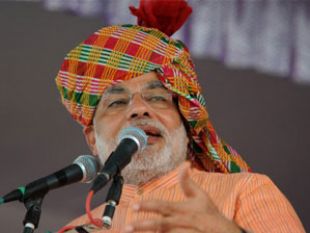
November 3:To understand why Narendra Modi is dwelling on issues like Sonia Gandhi's travel bills, Shashi Tharoor's wife, Manmohan Singh's "silence" - he called the prime minister "Maun" (silent) mohan - during his election campaign, it has to be realised that he can no longer play the communal card that was so useful to him earlier.
The run-up to the 2002 elections was marked by the Gujarat chief minister's provocative ploy of uttering the full name of then chief election commissioner (CEC) - James Michael Lyndoh - in order to emphasise his "alien" roots. He also pointed out that both the CEC and Congress president Sonia Gandhi are Christians.
As for Muslims, he mocked their propensity to marry four wives by saying, "hum panch, hamare pachis" (we are five with 25 children) to underline their violation of the family planning norms. Modi also described the refugee camps for the victims of the 2002 riots as child-producing centres.
How effective this relentless baiting of minorities was for Modi and the Bharatiya Janata Party (BJP) could be seen from the rise in the margin of victory of Maya Kodnani, who was recently convicted for instigating the riots, from 7,000 votes in 1998 to more than 60,000 in 2002. Five years later, the margin rose to 180,000 votes.
Considering, however, that Modi has since changed tack, stressing his development plank and even holding 'sadbhavna' (goodwill) fasts in aid of social harmony, he is unable to whip up communal sentiments. He has had no alternative, therefore, but to fall back on issues like Sonia Gandhi's travels abroad although he desisted from referring to her medical expenses lest this was considered too insensitive.
However, his tactlessness was evident when he brought up the subject of Shashi Tharoor's earlier removal from the external affairs ministry following allegations of his then girlfriend's involvement in an Indian Premier League irregularities. Not surprisingly, Modi's question at a poll rally - "has anyone seen a Rs. 50,000 crore girl friend ?" - drew a riposte from Tharoor that his wife was "priceless" and angry responses from women's organisations.
The danger, however, of a descent into coarseness is that it generates more unrefined conduct. While the BJP's Mukhtar Abbas Naqvi tried to outdo Modi's lack of urbane sensitivity by suggesting that Tharoor could be made a minister for love affairs, the Congress' "loose cannon", as he once called himself, Digvijay Singh, asked YouTube users to search for Yashoda Ben who is supposed to be Modi's spouse.
The lowering of the level of political discourse is not confined to Modi and his supporters and critics. While the activist-turned-politician, Arvind Kejriwal, continues to be a "muckraker", as BJP president Nitin Gadkari called him, the president of the one-man outfit, Janata Party, Subramanian Swamy, has entered the mud pit with allegations of fraudulence against Sonia and Rahul Gandhi.
The apparent reason for the present murky scene is that neither of the two main parties, the Congress and the BJP, has been able to pull decisively ahead of the other in the political race. The resultant vacuum has left enough scope for new entrants like Kejriwal and Co and habitual litigants like Swamy to muddy the waters.
A measure of the misgivings which prevail can be gauged from the fact that Anna Hazare, who is Kejriwal's mentor, has expressed the apprehension that his protege can become "power hungry". Anna himself has re-entered the arena after a brief pause during which Kejriwal left his company.
Now, Anna has constituted another team along with the former chief of the army staff, General V.K. Singh, whose term ended under a cloud because of a controversy over his year of birth. It remains to be seen whether the general and the soldier (Anna was once in the army) can prove to be as effective as the earlier group of activists initially were.
Unfortunately, none of this kerfuffle is expected to yield a clearer picture in the near future. While the expected Congress defeat in Gujarat may make the Manmohan Singh government nervous about pursuing reforms with any vigour, it is unlikely to be of much help to Modi in fulfilling his ambition of moving to the national stage because of the BJP's internal problems.
For one, Gadkari's embroilment in the charges of sleaze will not give him much time for an organisational reshuffle. For another, the possibility of former Karnataka chief minister B.S. Yeddyurappa leaving the party will throw the BJP into further confusion.
The Congress, on its part, will be unable to take advantage of the disarray in the opposition ranks - the Left is demoralised while the BJP is a house in turmoil. First, because of the charges of corruption against Robert Vadra, Salman Khurshid, Virbhadra Singh and others and, secondly, because it will take time for the reforms to yield results.





Comments
Add new comment